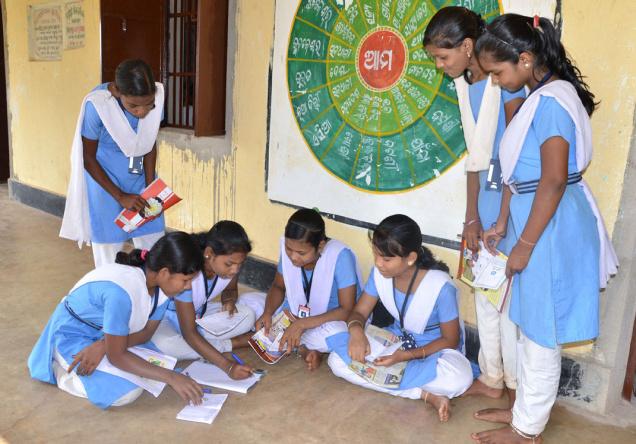Having a bank account with money all their own, SC/ST girls in Odisha never miss school
The money that was transferred to Pooja Das’ account is working overtime. This Class X student of Gaura Charan Vidyapitha in Jatni, Odisha’s Khorda district, has used it to repair her bicycle, pay her tuition fees and even help out her younger brother. Additionally, it has given her the incentive to attend school for 75 per cent of the working days and strive towards her ambition of becoming an engineer. “My two friends who had decided to discontinue school after Class VIII stayed on too, thanks to the stipend we now get in our bank accounts,” she says.
That exactly has been the aim of the Odisha Girls Incentive Programme (OGIP) that Chief Minister Naveen Patnaik launched in 2013 to impact around 2.5 lakh tribal and Dalit girls of the State studying in Class IX and X — to enthuse students to stay put in the education system and give their parents a reason to let them do so.
The chief minister’s initiative did not materialise on its own, it came after a one-year pilot project in Rayagada district in 2012 that evaluated the impact of such an incentive scheme on the attendance rates and enhanced interest in education among the marginalised communities. The key features of the scheme were also attractive — it would cover all government schools as well as government-aided and recognised private ones. Girls from the Schedule Castes and Schedule Tribes would have bank accounts through which they would be paid ₹2,000 over the year if they fulfilled the condition of 75 per cent attendance, which roughly translates into 18 days a month. In the first month of enrolment, ₹400 would be transferred, followed by ₹160 in the remaining months.
For Jyotsnarani in Class IX of Krushna Chandra Vidyapitha, one of the biggest joys was the experience of visiting a bank, seeing how it functions and actually being able to operate her own account — a rare opportunity for an SC/ST girl living in a village. Then having the money to choose what her priority purchases would be. “I learnt to operate my account without help and used the money to buy diaries, pay for my tuitions and acquire a much-needed umbrella. I also helped my parents and younger siblings at times,” she says.
The programme — a collaborated effort of the Odisha government together with funding from the UK government’s Department for International Development (DFID) and technical assistance from IPE Global — has been tweaked time and again for better results. “Once it was established that SC/ST girls were benefitting hugely from it, it was extended to boys too,” explains Ashwajit Singh, managing director, IPE Global
Achyutanand Naik, a beneficiary who had topped his school Krushna Chandra Vidyapitha and is in college this year, says, “I have friends who are now in college with me who were not at all inclined to even finish schooling. The scholarship egged them on.”
And how do the parents feel, having missed education and a decent livelihood in their time? Golakh Sethi, father of Rashmita studying in Class X of Gurujanga High School, Khurda, sums up his pride in his daughter’s abilities and independent status: “She has been quite prompt — from opening her bank account to operating it — she does it all on her own. I have never gone to the bank.”
And as more and more children join in, the programme has spread to 30 districts of the State, covering around 4.2 lakh SC/ST students in 2013-14. Of the children studying in approximately 8,900 high schools, nearly 4.15 lakh now have bank accounts. As keepers of their own purse strings, the children no longer think that dropping out of school is a smart option.
Author: PREETI MEHRA / MAMUNI DAS
Source: http://www.thehindubusinessline.com/features/young-scholars-hold-purse-strings/article6708573.ece

